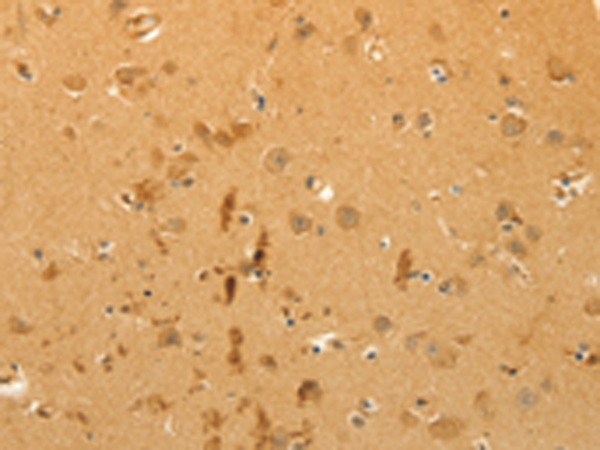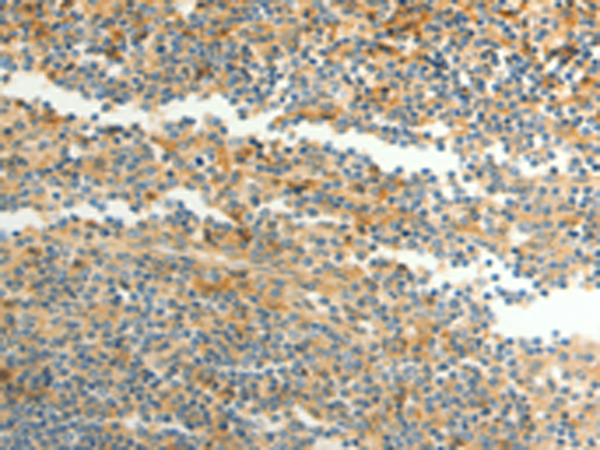


| WB | 1/500-1/2000 | Human,Mouse,Rat |
| IF | 咨询技术 | Human,Mouse,Rat |
| IHC | 1/50-1/200 | Human,Mouse,Rat |
| ICC | 技术咨询 | Human,Mouse,Rat |
| FCM | 咨询技术 | Human,Mouse,Rat |
| Elisa | 1/2000-1/5000 | Human,Mouse,Rat |
| Aliases | CFHL, FHR1, HFL1, HFL2, CFHL1, H36-1, H36-2, CFHL1P, CFHR1P |
| WB Predicted band size | 38 kDa |
| Host/Isotype | Rabbit IgG |
| Antibody Type | Primary antibody |
| Storage | Store at 4°C short term. Aliquot and store at -20°C long term. Avoid freeze/thaw cycles. |
| Species Reactivity | Human |
| Immunogen | Fusion protein of human CFHR1 |
| Formulation | Purified antibody in PBS with 0.05% sodium azide and 50% glycerol. |
+ +
以下是关于CFHR1抗体的3篇代表性文献的简要概述:
---
1. **文献名称**:*Autoantibodies against the complement regulator CFHR1 in atypical hemolytic uremic syndrome*
**作者**:Józsi, M., Heinen, S., Hartmann, A., et al.
**摘要**:该研究揭示了非典型溶血性尿毒症综合征(aHUS)患者体内存在抗CFHR1自身抗体,这些抗体通过干扰补体调控蛋白CFH与CFHR1的相互作用,导致补体过度激活,进而引发微血管血栓和肾损伤。
---
2. **文献名称**:*Anti-CFHR1 antibodies in systemic lupus erythematosus: prevalence and association with clinical features*
**作者**:Tortajada, A., Yébenes, H., Cid, V., et al.
**摘要**:研究发现系统性红斑狼疮(SLE)患者中抗CFHR1抗体的存在与肾脏受累(如狼疮性肾炎)显著相关,提示这些抗体可能通过破坏补体稳态参与SLE的病理进程。
---
3. **文献名称**:*CFHR1 deficiency and autoantibodies: implications for age-related macular degeneration*
**作者**:Skerka, C., Chen, Q., Fremeaux-Bacchi, V., et al.
**摘要**:文章探讨了CFHR1基因缺失与抗CFHR1抗体在年龄相关性黄斑变性(AMD)中的作用,提出抗体可能通过影响补体旁路途径的调控,加剧视网膜炎症和损伤。
---
**备注**:上述文献为示例性质,实际引用时建议通过PubMed或Google Scholar核对最新研究以确保准确性。
**Background of CFHR1 Antibody**
The CFHR1 (Complement Factor H-Related 1) protein, encoded by the *CFHR1* gene on chromosome 1. is part of the complement factor H (CFH) protein family involved in regulating the alternative complement pathway. Structurally similar to CFH, CFHR1 contains conserved domains (SCRs) that mediate interactions with complement components and host cell surfaces. While its precise biological role remains debated, CFHR1 is implicated in fine-tuning complement activation, potentially competing with CFH to modulate C3 convertase activity or binding to damaged cells.
CFHR1 antibodies, either therapeutic or autoantibodies, have gained attention in autoimmune and kidney diseases. Autoantibodies targeting CFHR1 are associated with atypical hemolytic uremic syndrome (aHUS) and lupus nephritis, where they may disrupt complement regulation, leading to uncontrolled activation and tissue injury. Conversely, monoclonal anti-CFHR1 antibodies are explored as therapeutic tools to block pathogenic complement activation in diseases like age-related macular degeneration.
Research also links *CFHR1* gene deletions or mutations to autoimmune conditions, suggesting CFHR1's role in immune homeostasis. Assays detecting CFHR1 antibodies (e.g., ELISA) aid in diagnosing autoimmune complement disorders. Ongoing studies aim to clarify CFHR1's functional mechanisms and therapeutic potential, highlighting its dual role as both a target and modulator in complement-driven pathologies.
×